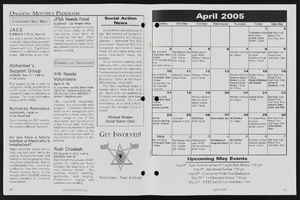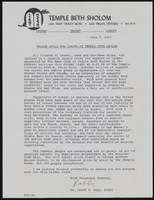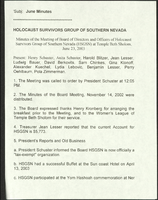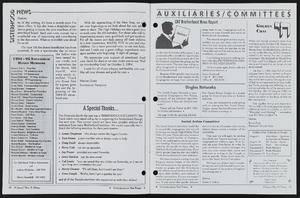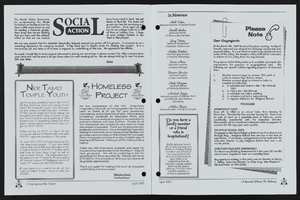Search the Special Collections and Archives Portal
Search Results
Growing Up Jewish roundtable oral history interviews
Identifier
Abstract
Oral history interviews with the Growing Up Jewish roundtable conducted by Barbara Tabach on January 31, 2016 and February 28, 2016 for the Southern Nevada Jewish Heritage Project. In these interviews, Jewish residents of Las Vegas, Nevada describe their experiences growing up Jewish in the developing city. The interviewees describe their early lives, the cultural differences they faced, and how they stayed connected with their Jewish identities.
Archival Collection
Commemoration of Kristallnacht with Esther Toporek Finder, Raymonde Fiol, Alexander Kuechel, Philipp Meinecke, and Felipe Goodman oral history roundtable
Identifier
Abstract
Oral history roundtable interview with members of the Kristallnacht Commemoration conducted by Barbara Tabach on March 17, 2015 for the Southern Nevada Jewish Heritage Project. Esther Toporek Finder, Raymonde Fiol, Alexander Kuechel, Philipp Meinecke, and Rabbi Felipe Goodman discuss the importance of remembering the Holocaust, the Kristallnacht event and why they participated in the commemoration event hosted at Temple Beth Sholom.
Archival Collection
Dayvid Figler oral history interview
Identifier
Abstract
Oral history interview with Dayvid Figler conducted by Barbara Tabach on June 22, 2016 for the Southern Nevada Jewish Heritage Project. Figler discusses his youth, his bar mitzvah at Temple Beth Sholom, and path to a career as a criminal defense attorney. He also talks about embracing Las Vegas, Nevada as his home, owning a home in the John S. Park neighborhood, and mentions a number of literary depictions of Las Vegas that he admires.
Archival Collection

Transcript of interview with Michael Saltman by Barbara Tabach, December 16, 2014
Date
Archival Collection
Description
In this interview, Michael Saltman recounts his family background, his schooling in Michigan, and living abroad in London and Munich. His travels to Israel in 1968 reinforced his connection to Judaism. Saltman and his wife, Sonja, moved to Las Vegas in 1975 and he began working with Larry Larkin, who eventually became his partner. He discusses several projects he completed with Larkin, including shopping centers and apartment complexes. He talks about the changes in Las Vegas that came about from the availability of financing from legitimate sources, and the population growth of the area. He then talks about his involvement in the local Jewish community with the Jewish Federation, Anti-Defamation League and Congregation Ner Tamid.
In 1942, Michael Saltman, the son of a rugged Canadian entrepreneur and of an educator, was born in Flint, Michigan. Michael spent a fulfilling childhood in Flint, where his family was involved in the Jewish community, even helping start a new temple. However, his life changed dramatically when his father passed away during his teenage years. At his mother's insistence, Michael went to law school after graduating from Michigan State University, and received his Juris doctor from Wayne State University. From Detroit, Michael headed to London to participate in an LL.M. program, though he quickly withdrew and landed a position with a life insurance and investment company in London. Michael soon relocated to the company's Geneva office, where his job included establishing operations in Israel. It was during these trips that he more intensely connected with Judaism and his Jewish identity. Michael left the company to join a former colleague at Shareholders Capital Corporation, where he met his wife Sonja. The couple moved to Munich, where they lived until 1975, until moving to Las Vegas. In Las Vegas, Michael became a successful real estate developer. His projects include apartments, shopping centers and office parks, like Village Apartments, Campus Village Shopping Center and Renaissance Center. He later opened Food 4 Less grocery stores in Nevada, Utah and California, eventually buying the Kansas-based company from Lou Falley. He and his partner later sold the company to Kroger. Michael served on the local Jewish Federation's board of directors, and Sonja is a longtime board member for the Anti-Defamation League's regional office in Las Vegas. In 2003, Michael and Sonja co-founded the Saltman Center for Conflict Resolution within William S. Boyd School of Law. Michael's other efforts to promote peaceful conflict resolution include the production of Streetball Hafla, a movie shot in Israel about Jewish and Palestinian teenagers interacting in basketball camp.
Text

Transcript of interview with Eleazar "Al" Martinez by Marcela Rodriguez-Campo, October 2, 2018
Date
Archival Collection
Description
In his lifetime, Eleazar Martinez has climbed both literal and figurative mountains as an avid outdoorsman and social justice advocate for Latinx issues. Born in Sweetwater, Texas, Eleazar (Al for short) grew up connected to the land and his family. Al comes from a large family with strong ties in Texas and Mexico. His mother worked the fields and his father was a construction worker who instilled in their children the importance of a strong work ethic and the pursuit of an education. Al shares about growing up during a time when Spanish was banned from schools and children would get punished if they were caught using their home languages. His experiences developed his aspiration to serve his community and fight for people’s rights. After a short stint in the Navy, Al followed his instincts and sought out a college education and majored in sociology. His interest in social issues lead him to serve in a range of roles from psychiatric support, community education outreach, and counseling. At one point, Al even helped mediate tensions between gangs and law enforcement in order to prevent violence from erupting. Since arriving in Las Vegas in 1998, Al has been working alongside diverse communities to build solidarity. Today, he works as a supervisor for the Whitney Recreation Center and leader in Hispanics Enjoying Camping, Hunting, and the Outdoors (HECHO). As Al would describe himself, he is “a proud Mexican Latino American, a Tejano with a Chicano attitude”.
Text

